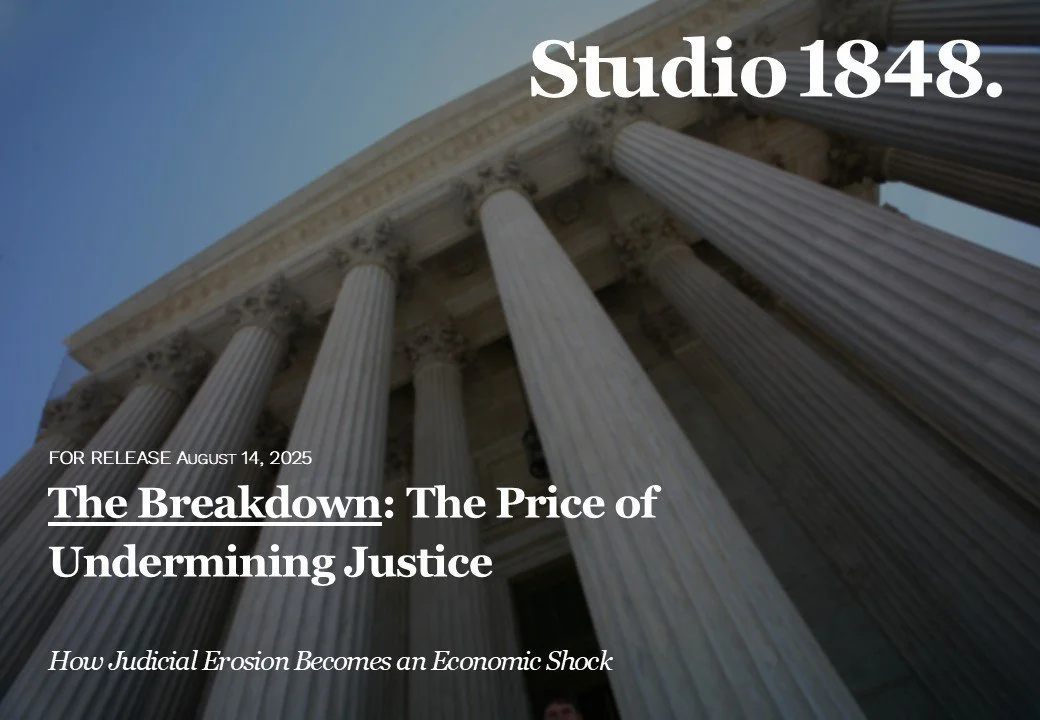The Breakdown: When Justice Falters, the Economy Pays
When courts lose their independence, economies lose their predictability. It’s that simple, and that dangerous. Contracts stop being binding promises and start being political gambles. Every deal, loan, and investment carries an unspoken question: Will the rules still hold when I need them most?
The answer, increasingly, is maybe. And “maybe” is expensive. Investors demand higher returns to take the risk. Banks demand more collateral and shorten loan terms. Companies delay major projects. In months, not years, borrowing costs rise, currencies weaken, and growth slows.
As usual, you will be able to find a more in-depth analysis of this issue in this week’s accompanying Report.
The damage runs deeper than markets.
Once politics replaces rules, economic rewards flow to connections, not productivity. Managers spend time cultivating influence instead of innovating. Capital chases political certainty, not commercial opportunity. Small and medium-sized businesses, without lobbyists or insider ties, face higher costs and fewer chances to compete.
The long-term investment climate deteriorates. Infrastructure, factories, and R&D all depend on confidence that contracts will be honored years down the line. When that confidence is gone, only quick-turnover, high-markup projects move forward. Economies that could have been building their future end up consuming their present.
The financial system feels it first.
Weaker courts mean weaker creditor rights. Foreclosures drag on, insolvencies become unpredictable, and recovery rates drop. Banks retreat to lending only to the “too-connected-to-fail,” leaving innovators and startups starved for capital. Capital markets shrink as disclosure enforcement fades and minority shareholder protections vanish. Ambitious companies incorporate abroad, taking jobs, growth, and tax revenue with them.
Labor markets don’t escape either.
Fewer formal jobs and weaker contracts push workers into the informal sector, with lower pay and no protections. Skilled workers leave after seeing fewer opportunities and greater arbitrary risk. The resulting brain drain hollows out a country’s innovative capacity just when it needs it most.
This is not just an economic story, it’s a political feedback loop.
As rents from political discretion grow, beneficiaries fight to keep them. Lower growth and higher inequality stoke social conflict, which justifies “emergency” measures that further erode judicial independence. Breaking this cycle is hard. Restoring formal rules is not enough; markets and citizens must believe the rules will outlast the next political shift.
So, what works?
Ideally, we should shield key courts from political cycles with staggered terms and supermajority appointments. Give them budget autonomy and block structural changes without broad consensus. Ring-fence commercial, competition, and insolvency jurisdictions from political interference. Publish decisions promptly, assign cases randomly, and digitize filings to limit manipulation. Strengthen arbitration and corporate governance standards. Protect creditor rights with hard timelines and transparent priorities.
External anchors, investment treaties, development programs tied to measurable judicial performance, can help, but they cannot replace domestic credibility. If only foreigners enjoy reliable justice, the system loses legitimacy.
For businesses and investors, adaptation is essential.
The issue with this policy prescription is that it must be enforced by the government. But, what should businesses and investors do if the Executive and Legislative are the ones undermining the Judiciary? There are a couple of options in this area as well. Shorten payback periods. Diversify legal exposure. Harden contracts with choice-of-law and arbitration clauses. Focus on export-oriented or globally arbitrable sectors. In short: plan for volatility, and price in political risk even if the constitution still promises otherwise.
The bottom line is stark: judicial erosion is not only a technical concern for lawyers, a human rights issue with advocates, or even a threat to the democracy everyday citizens need in modern societies; it is also, and very clearly, a macroeconomic shock. It raises borrowing costs, slows growth, and entrenches inequality. And because much of the damage comes from shattered expectations, the cost of inaction compounds. The sooner independence is rebuilt, and seen to be rebuilt, the less permanent the loss.

